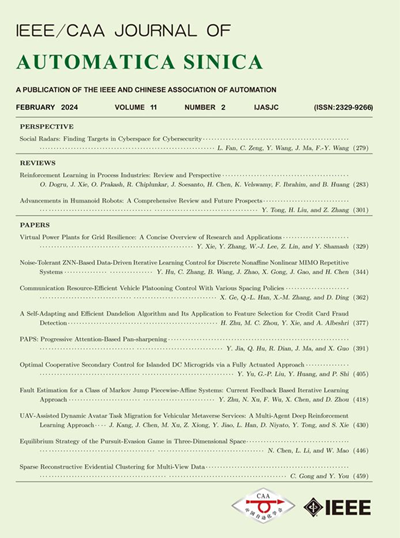A Correntropy-Based Echo State Network with Application to Time Series Prediction
IF 15.3
1区 计算机科学
Q1 AUTOMATION & CONTROL SYSTEMS
引用次数: 0
Abstract
As a category of recurrent neural networks, echo state networks (ESNs) have been the topic of in-depth investigations and extensive applications in a diverse array of fields, with spectacular triumphs achieved. Nevertheless, the traditional ESN and the majority of its variants are devised in the light of the second-order statistical information of data (e.g., variance and covariance), while more information is neglected. In the context of information theoretic learning, correntropy demonstrates the capacity to grab more information from data. Therefore, under the guidelines of the maximum correntropy criterion, this paper proposes a correntropy-based echo state network (CESN) in which the first-order and higher-order information of data is captured, promoting robustness to noise. Furthermore, an incremental learning algorithm for the CESN is presented, which has the expertise to update the CESN when new data arrives, eliminating the need to retrain the network from scratch. Finally, experiments on benchmark problems and comparisons with existing works are provided to verify the effectiveness and superiority of the proposed CESN.求助全文
约1分钟内获得全文
求助全文
来源期刊

Ieee-Caa Journal of Automatica Sinica
Engineering-Control and Systems Engineering
CiteScore
23.50
自引率
11.00%
发文量
880
期刊介绍:
The IEEE/CAA Journal of Automatica Sinica is a reputable journal that publishes high-quality papers in English on original theoretical/experimental research and development in the field of automation. The journal covers a wide range of topics including automatic control, artificial intelligence and intelligent control, systems theory and engineering, pattern recognition and intelligent systems, automation engineering and applications, information processing and information systems, network-based automation, robotics, sensing and measurement, and navigation, guidance, and control.
Additionally, the journal is abstracted/indexed in several prominent databases including SCIE (Science Citation Index Expanded), EI (Engineering Index), Inspec, Scopus, SCImago, DBLP, CNKI (China National Knowledge Infrastructure), CSCD (Chinese Science Citation Database), and IEEE Xplore.
 求助内容:
求助内容: 应助结果提醒方式:
应助结果提醒方式:


